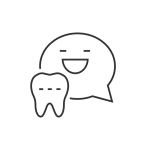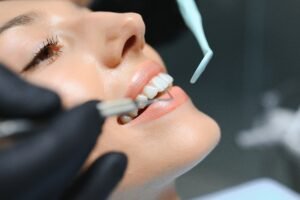There’s more to Ideal Oral Hygiene than avoiding cavities and gum disease. According to studies, the condition of a person’s teeth and gums may indicate their general health. Experts agree that poor oral health is a major concern across the world.
Cavities and gum disease may cause discomfort, loss of self-esteem, and even tooth loss if they are not treated. Malnutrition, speech impairment, and other difficulties in one’s professional and personal life may result from these conditions. Often, our dentists in Calgary come across such patients and help them address these issues better.
Taking care of your teeth and gums reduces strain on dental offices and their employees, which is excellent for your health and your family. Take care of your teeth and gums with these 7 easy, at-home practices that will make a big difference in your oral health.
Read More: What Is Gingival Enlargement? Treatment Options and Aftercare for Better Management
Daily Routines for Ideal Oral Hygiene
1. Floss Your Teeth Daily
Plaque may build up in areas your toothbrush can’t get to, so it’s crucial to floss once a day to get rid of it. This plaque builds up and becomes hard if it isn’t removed. This hardens into tartar and ultimately has to be removed by an expert. Cavities, bone loss, gum disease, tooth loss, and so forth may all result from this accumulation. Remember to floss your teeth regularly to maintain good oral hygiene.
2. Brush for at least 2-3 minutes
Most individuals don’t spend nearly enough time cleaning their teeth, so when you do, make sure you take your time. You should aim to brush for at least two to three minutes, with around one and a half minutes dedicated to each arch (upper and lower).
Must See: 5 Causes of Teeth Discoloration and How Bleaching Can Help
3. Eat Healthily
The chances of developing cavities may be reduced, and optimal oral health can be maintained by selecting foods that promote these goals. Choose fresh produce, lean meat, dairy products, and nuts. When you need a fast snack, chocolate is great. Drinking water might help keep your mouth clean between brushing and flossing.
4. Use apple cider vinegar
Apple cider vinegar is not just any ordinary sour condiment but it boasts antibacterial properties, which can help keep your mouth free from plaque-causing bacteria. Some dental problems, including bad breath and tooth decay, may be attributed to bacterial overgrowth. So try using apple cider vinegar as a mouthwash after meals.
After using apple cider vinegar as mouthwash, gargle with water to remove any excess liquid. If the flavour is too strong, dilute apple cider vinegar with water before use.
Read More: Flossing: Why Is It Necessary and How You Should Do It Right?
5. Visit dentists regularly
According to experts, the average person should have a dental exam every six months. During a regular dental checkup, the hygienist will polish the teeth that help you keep your teeth naturally white. Also, a regular visit helps remove any tartar or plaque that has developed.
The dentist looks for obvious problems, including tooth decay, gum disease, and oral cancer. Sometimes they’ll utilize X-rays of the teeth to look for cavities.
A study’s findings reaffirmed the importance of semiannual dental checkups for kids in Calgary and teens in the fight against tooth decay. Adults who maintain consistent, thorough, and proper daily dental hygiene are less likely to need to see the dentist as often.
Anyone curious about how often they should see the dentist might ask their dentist. The answer might differ for each individual because of their age, medical history, and current oral condition. But if you’ve seen any changes in your mouth, it’s time to make an appointment with your dentist.
Read More: What Are the Common Myths about Root Canal Therapy?
6. Limit sugary foods and starches
Caries, or tooth decay, are one possible consequence of a sugary diet. Consistent evidence shows that sugar is a major contributor to many oral health problems. While sweets and pastries are often to blame, many processed meals also include added sugar.
The World Health Organization (WHO) advises keeping sugar consumption to less than 10 percent of daily calories. Systematic reviewers concluded that bringing that number down to 5% would further mitigate tooth caries and other issues.
Starchy meals, including crackers, bread, chips, and spaghetti, have also been linked to tooth decay, according to experts. The American Dental Association (ADA) explains that acid-producing bacteria feed on the simple carbohydrates left behind after consuming these items. The acid in this food may erode tooth enamel.
Check More: What are the common dental issues during Christmas, and how to avoid those?
The American Diabetes Association advises replacing starchy meals with a diet high in fibre-rich fruits and vegetables and low in sugar-sweetened dairy products.
7. Avoid Smoking
Smoking is not the best choice for one’s health. It can be harmful to your oral health in addition to the lungs and respiratory system. Damage to teeth’s appearance and health, gum inflammation, and even oral cavity cancer are all possible results.
We recognize that breaking the habit of smoking is hard. It may cause significant damage to the mouth, but stopping can reduce this risk. The length of time you’ve used tobacco products is irrelevant. Quit smoking for oral health; your lungs and blood vessels will thank you.
Must See: How Can Seniors Citizens Take Care of Their Dental Health?
Conclusion
With patience, you can find time to improve your dental hygiene habits. But you can turn to professionals if you need help taking better control of your oral habits and keeping your smile glowing.
Fortunately, you can hit a Google search ‘dentist near me’ in Calgary who can help you with teeth whitening and other professional dental hygiene services near Calgary. Besides helping you regain confidence with a smile, our dentists in Calgary will help keep your teeth, tongue, and gums healthy. Those are enough reasons not to skip your next visit to the Best dental clinic in Calgary.















